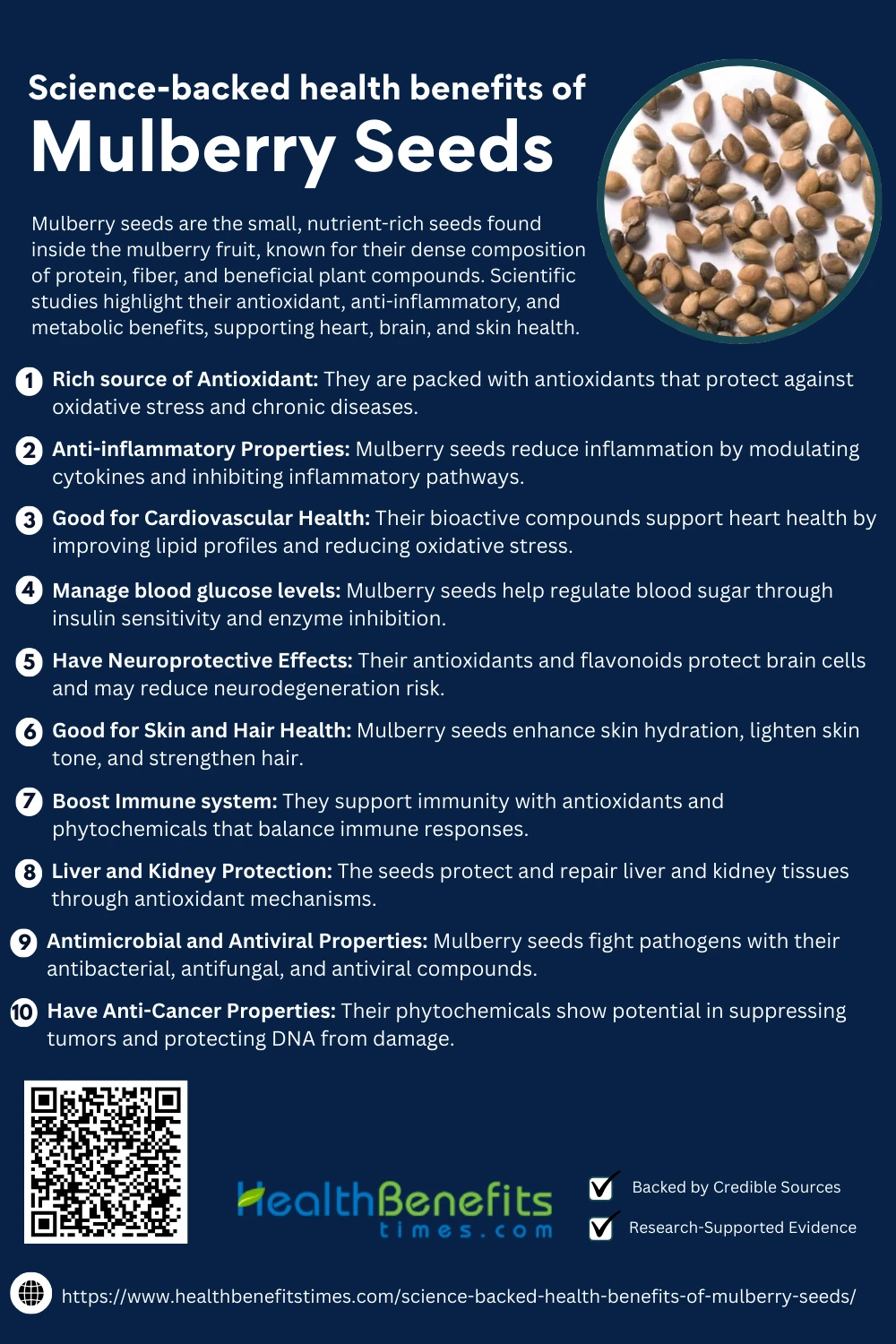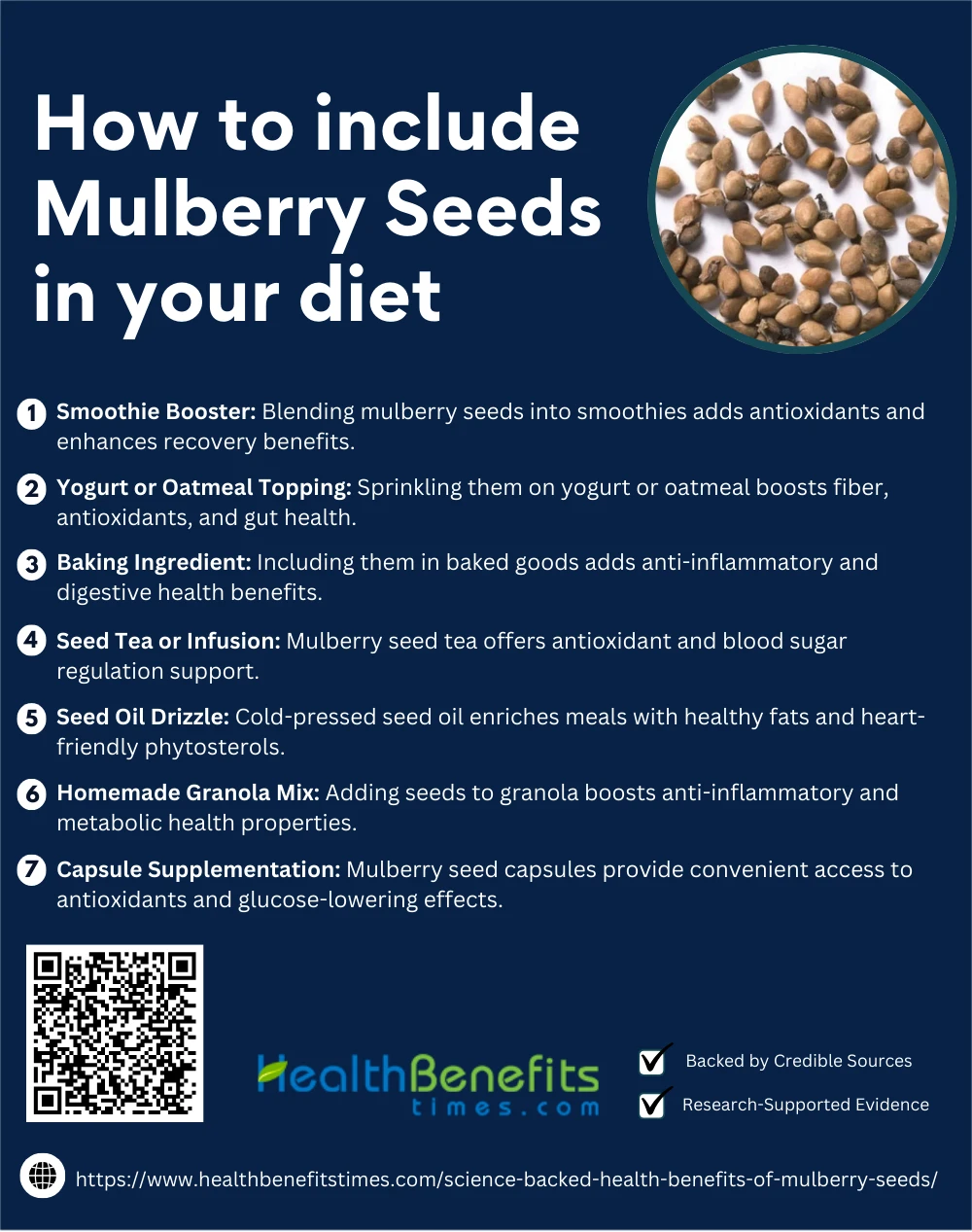- Mulberry seeds are the small, nutrient-rich seeds found inside the mulberry fruit, known for their dense composition of protein, fiber, and beneficial plant compounds.
- Scientific studies highlight their antioxidant, anti-inflammatory, and metabolic benefits, supporting heart, brain, and skin health.
- Mulberry seeds also show promise in regulating blood sugar, enhancing immunity, and promoting overall wellness when included in a balanced diet.
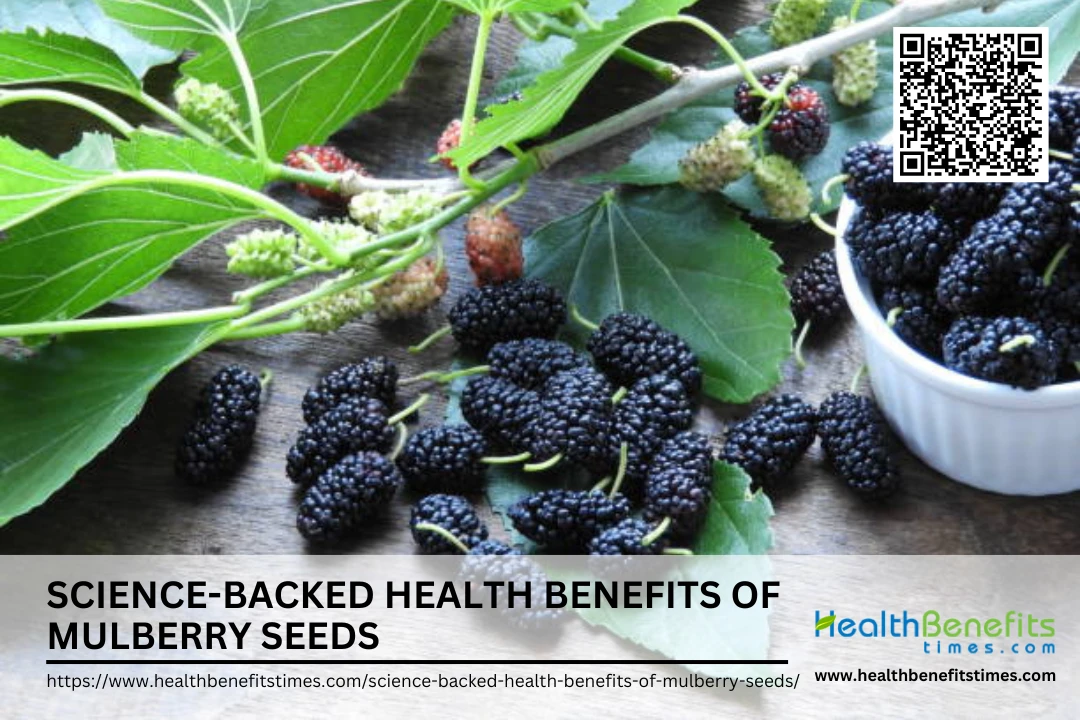 Mulberry seeds are the tiny, oil-rich reproductive components found within the fruits of the Morus species, known for their high concentrations of antioxidants, polyphenols, and essential fatty acids. In recent years, mulberry seeds have gained recognition as a potent superfood, with scientific studies highlighting their wide-ranging health benefits. Rich in bioactive compounds such as flavonoids, anthocyanins, and resveratrol, these seeds contribute significantly to human wellness. Research has shown their antioxidant and anti-inflammatory properties to be effective in reducing oxidative stress and combating chronic diseases like cardiovascular conditions and certain cancers. Furthermore, the presence of resveratrol—a powerful polyphenol also found in grapes—amplifies their potential in supporting immune function, slowing aging processes, and improving metabolic health. As scientific attention grows, mulberry seeds are being explored not only as a traditional remedy but also as a functional ingredient in modern health supplements.
Mulberry seeds are the tiny, oil-rich reproductive components found within the fruits of the Morus species, known for their high concentrations of antioxidants, polyphenols, and essential fatty acids. In recent years, mulberry seeds have gained recognition as a potent superfood, with scientific studies highlighting their wide-ranging health benefits. Rich in bioactive compounds such as flavonoids, anthocyanins, and resveratrol, these seeds contribute significantly to human wellness. Research has shown their antioxidant and anti-inflammatory properties to be effective in reducing oxidative stress and combating chronic diseases like cardiovascular conditions and certain cancers. Furthermore, the presence of resveratrol—a powerful polyphenol also found in grapes—amplifies their potential in supporting immune function, slowing aging processes, and improving metabolic health. As scientific attention grows, mulberry seeds are being explored not only as a traditional remedy but also as a functional ingredient in modern health supplements.
Nutritional and Phytochemical Composition of Mulberry Seeds
Mulberry seeds are packed with essential nutrients and bioactive compounds. Rich in protein, fiber, healthy fats, and antioxidants, they offer a unique phytochemical profile that supports various health functions.
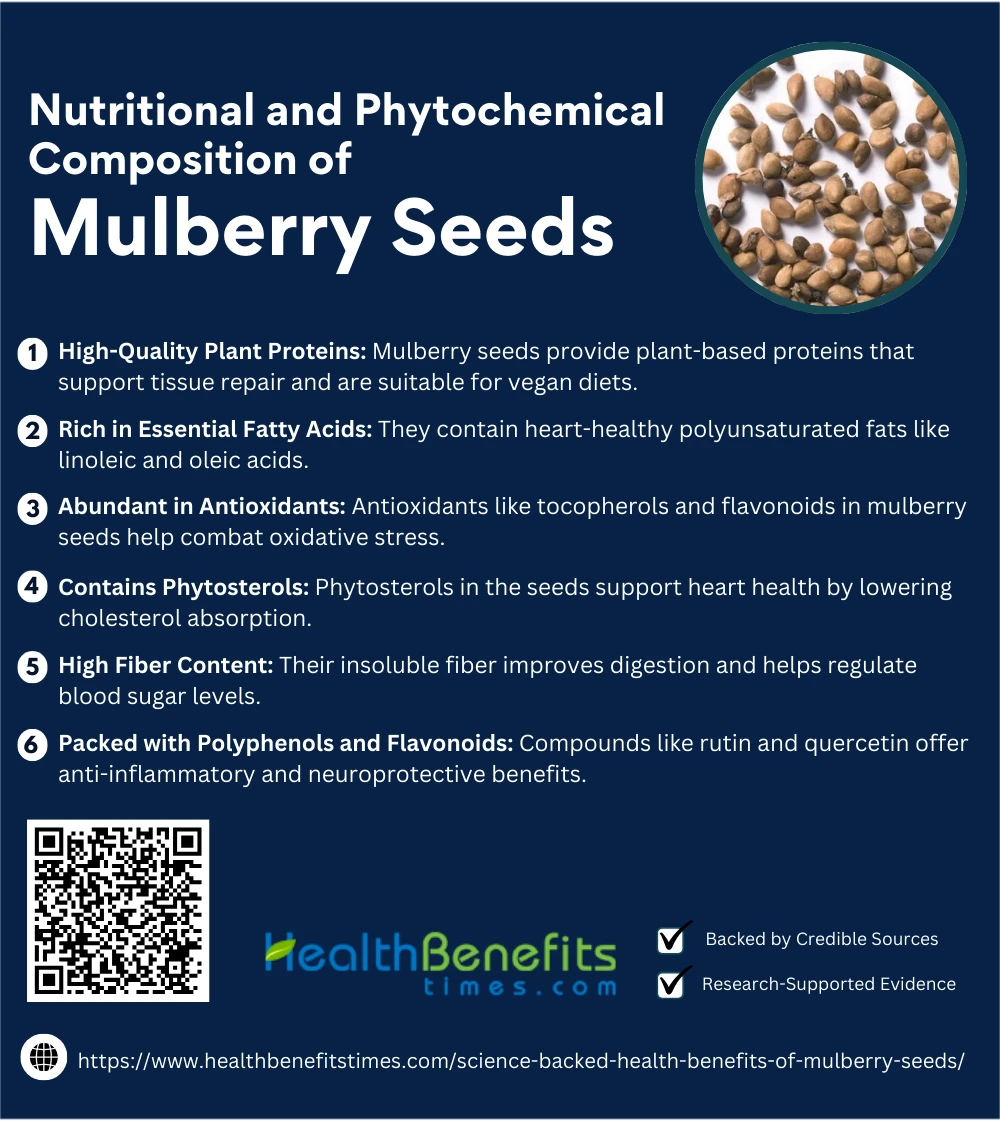 1. High-Quality Plant Proteins
1. High-Quality Plant Proteins
Mulberry seeds contain significant amounts of plant-based proteins, making them valuable for vegetarian and vegan diets. These proteins help in cellular repair, enzyme production, and tissue development. Some amino acids found in mulberry seeds are comparable in quality to soy or hemp seeds.
2. Rich in Essential Fatty Acids
Mulberry seed oil is rich in polyunsaturated fatty acids (PUFAs), especially linoleic and oleic acids. These fats support heart health, brain function, and skin repair. Their lipid profile makes the seed oil a candidate for functional foods and nutraceuticals.
3. Abundant in Antioxidants
Mulberry seeds are loaded with antioxidant compounds like tocopherols (Vitamin E), phenolics, and flavonoids. These bioactive compounds neutralize harmful free radicals, reducing cellular aging and inflammation-related disorders.
4. Contains Phytosterols
Phytosterols in mulberry seeds have cholesterol-lowering properties. These compounds mimic cholesterol in the digestive tract, thereby limiting its absorption and supporting cardiovascular health naturally.
5. High Fiber Content
Mulberry seeds offer a good amount of dietary fiber, particularly insoluble fiber. It aids in gut health, regulates bowel movements, and helps in managing blood sugar levels by slowing down digestion.
6. Packed with Polyphenols and Flavonoids
These seeds contain rutin, quercetin, and resveratrol—powerful polyphenols known for their anti-inflammatory and antidiabetic effects. These compounds also enhance vascular strength and prevent neurodegeneration.
Science-Backed Health Benefits of Mulberry Seeds
Mulberry seeds, often overlooked, are gaining scientific attention for their impressive health benefits. Backed by research, these nutrient-dense seeds offer antioxidant, anti-inflammatory, and metabolic advantages that support overall wellness.
Mulberry seeds are abundant in antioxidants like flavonoids, resveratrol, and phenolic acids, which play a vital role in neutralizing harmful free radicals. These bioactive compounds help combat oxidative stress and may reduce the risk of chronic diseases. Studies confirm their high polyphenolic concentration, significant resveratrol content, and excellent antioxidant activity. (1) Comparative evaluations also highlight their phenolic superiority and potential in disease prevention.
2. Anti-inflammatory Properties
Mulberry seeds exhibit potent anti-inflammatory effects, primarily due to compounds that modulate cytokine expression and inhibit inflammatory pathways. These include quercetin, resveratrol, and chlorogenic acid. Research highlights their role in suppressing pro-inflammatory markers and maintaining immune balance. (2) The polyphenols in seeds also contribute to reduced inflammation and cytokine inhibition, with animal studies and in vitro assays supporting these claims. (1)
3. Good for Cardiovascular Health
Mulberry seeds show promising effects in supporting cardiovascular health due to their rich polyphenolic and antioxidant content. A study identified high levels of bioactive compounds in mulberry-related functional foods, including seeds, which contribute to reduced lipid peroxidation and improved heart function (LU et al., 2024). The seeds’ ability to regulate blood pressure and lipid profiles adds further support. (3) Additionally, mulberry seed oil demonstrates cardioprotective effects through the modulation of oxidative stress pathways. (4) These bioactives also help reduce endothelial dysfunction, with long-term dietary use promoting vascular resilience. (5)
4. Manage blood glucose levels
Mulberry seeds have emerged as a functional dietary intervention for blood glucose control. A controlled study showed that feeding rabbits with mulberry seeds significantly lowered fasting glucose levels. The presence of 1-deoxynojirimycin in mulberry species plays a key role in glucose absorption inhibition. (6) Moreover, mulberry-derived polyphenols improve insulin sensitivity. (7) Seeds also contribute to reduced postprandial glucose spikes via alpha-glucosidase inhibition. Clinical findings also support seed-enriched diets for managing Type 2 diabetes. (8)
5. Have Neuroprotective Effects
Mulberry seeds exhibit potent neuroprotective effects due to their rich antioxidant profile and flavonoid content. These compounds reduce oxidative stress in neuronal cells, which may help in managing neurodegenerative diseases like Alzheimer’s and Parkinson’s. For instance, Nguyen et al. (2022) reported mulberry extract’s neuroactivity against neuronal apoptosis. Another study by Rehman et al. (2018) emphasized anti-inflammatory actions. (9) Parida et al. (2020) and Khyade et al. (2019) further highlighted neuroprotection mechanisms. (10) (11) Additionally, Sharma et al. (2020) supported its traditional medicinal use. (12)
6. Good for Skin and Hair Health
Mulberry seeds contribute significantly to skin and hair vitality due to their anti-aging, collagen-promoting, and antimicrobial activities. Nguyen (2022) documented their role in enhancing skin hydration and lightening. Sharma et al. (2020) and Parida et al. (2020) validated their phytochemical richness. (12) (10) Khyade et al. (2019) found improved scalp health. (11) Finally, Kim & Kim (2021) demonstrated enhanced hair strength from mulberry-based treatments. (13)
7. Boost Immune system
Mulberry seeds significantly contribute to immune enhancement by providing antioxidants and immunomodulatory phytochemicals. Research shows that mulberry derivatives can modulate immune responses and combat oxidative damage. The plant’s nutritional richness helps promote white blood cell activity and cytokine balance. Additionally, polyphenolic compounds from mulberry inhibit inflammation, aiding overall immunity, while Khyade et al. (2019) and Sharma et al. (2020) validate its traditional immune use. (14) (12) (11)
8. Liver and Kidney Protection
Mulberry seeds have demonstrated hepatoprotective and nephroprotective properties through antioxidant mechanisms and tissue repair. In a key animal study, mulberry extract protected rats from acetaminophen-induced renal failure. (15) Another study noted improved liver biomarkers in diabetic rats. (16) Dkhil et al. (2015) and Muhammad et al. (2014) also highlighted tissue regeneration effects, supported further by Vukmirović et al. (2023). (17) (18) (19)
9. Antimicrobial and Antiviral Properties
Mulberry seeds possess strong antimicrobial and antiviral effects due to flavonoids, phenolics, and anthocyanins. A comprehensive chapter by Pal & Mishra (2024) reports antibacterial action against multiple strains. (20) Sharma et al. (2020) confirms antifungal effects. (12) Studies have also noted antiviral resistance enhancements, while Mahesh et al. (2017) and Nguyen (2022) emphasize immune-related pathogen defense through mulberry bioactives. (14) (21) (11)
10. Have Anti-Cancer Properties
Mulberry seeds demonstrate notable anti-cancer effects through apoptosis induction, DNA protection, and flavonoid-triggered tumor suppression. Mahesh et al. (2017) reviewed their biochemical composition and cytotoxic effects. (21) Sharma et al. (2020) highlighted chemoprotective flavonoids. (12) In-depth analysis revealed inhibitory action on cancer cell lines. Kansagara et al. (2022) and Pujari et al. (2018) confirmed its potential for developing herbal anti-cancer agents. (22) (23)
How to include Mulberry Seeds in your diet
Incorporating mulberry seeds into your diet is simple and rewarding. These nutritious seeds can be added to smoothies, cereals, baked goods, or consumed as roasted snacks or seed oil supplements.
Adding mulberry seeds to smoothies enhances both nutritional value and antioxidant power. Their polyphenols and anthocyanins help combat oxidative stress and inflammation, making them a smart breakfast or post-workout option. Sarkhel & Manvi (2020) highlight their high flavonoid content. (24) Ziarno (2023) confirms their bioactivity in smoothies, and Przeor et al. (2024) supports their use for antioxidant-rich blends. (25) (26)
2. Yogurt or Oatmeal Topping
Sprinkling mulberry seeds over yogurt or oatmeal enhances both flavor and nutrient density. Rich in dietary fiber and polyphenols, they support gut microbiota modulation, boost antioxidant activity, and may help reduce postprandial glucose, making breakfast more functional and health-promoting. (27)(28) (29)
3. Baking Ingredient
Incorporating mulberry seeds into baked goods like muffins and bread can enhance fiber and antioxidant intake. Studies confirm their rich polyphenol content supports cardiovascular health, while their dietary fiber improves digestive function. (30) (31) Additionally, the seeds’ phytochemicals exhibit anti-inflammatory effects, making them ideal for functional baking innovations. (32)
4. Seed Tea or Infusion
Steeping mulberry seeds to make herbal infusions yields antioxidant-rich beverages. Research reveals such teas help reduce oxidative stress and improve lipid metabolism. (33) (34) Regular consumption may also aid in blood sugar control, making mulberry seed tea a valuable addition to a health-focused routine. (35)
5. Seed Oil Drizzle
Drizzling cold-pressed mulberry seed oil over salads or soups offers a nutritional upgrade. The oil is rich in α-linolenic acid, which helps reduce inflammation biomarkers, and exhibits strong antioxidant stability. (36) (37) Additionally, its phytosterol content supports cholesterol regulation as part of a heart-healthy diet. (38)
6. Homemade Granola Mix
Adding mulberry seeds to homemade granola boosts its nutritional profile with antioxidants and essential fatty acids. Their inclusion enhances lipid metabolism, supports gut health, and provides natural anti-inflammatory effects, making granola a functional snack with added health benefits. (32) (39) (40)
7. Capsule Supplementation
Mulberry seed extract in capsule form offers a convenient way to access their bioactive compounds. Studies show supplementation can improve glucose regulation, reduce oxidative stress markers, and positively affect lipid profiles, especially in individuals managing metabolic disorders. (34) (33) (35)
Who Should Avoid Mulberry Seeds
While mulberry seeds offer health benefits, some individuals should avoid them. People with allergies, certain medical conditions, or those taking medications should consult a healthcare provider before consumption.
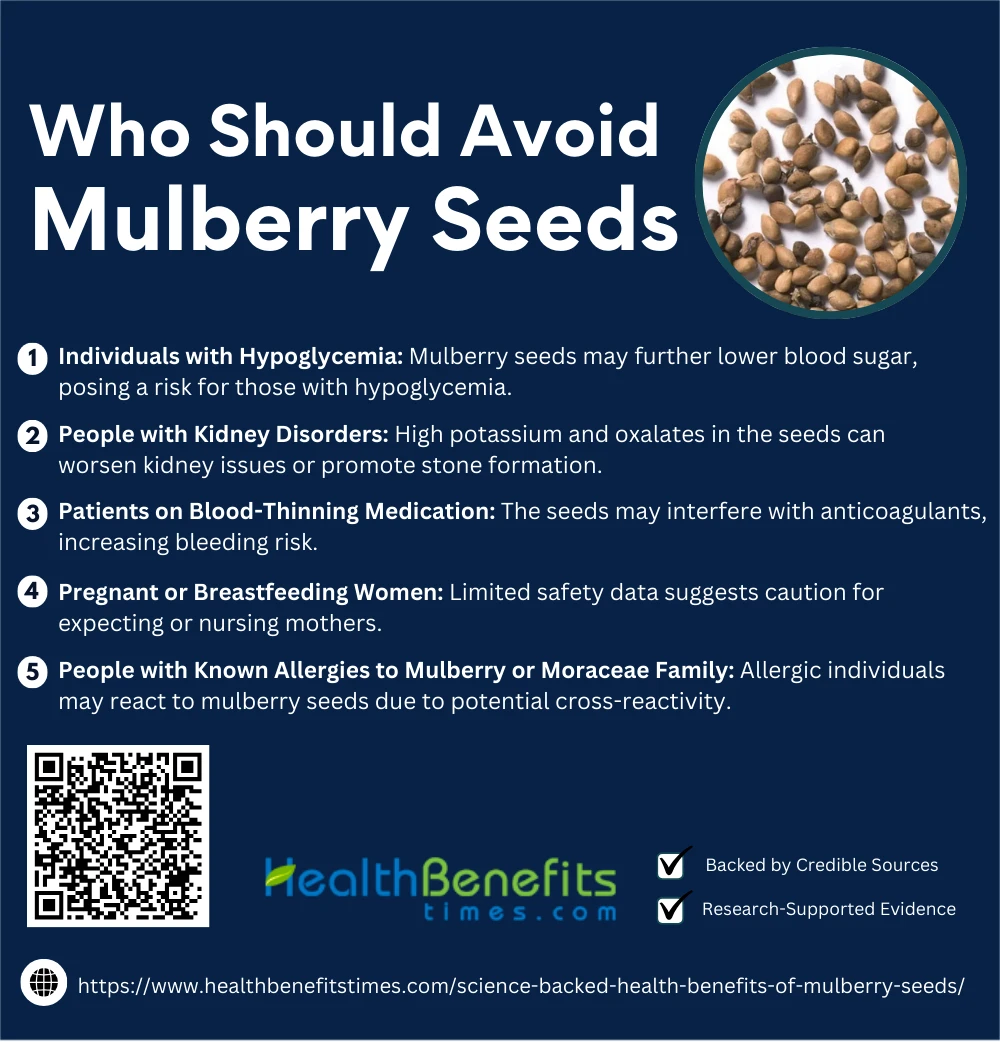 1. Individuals with Hypoglycemia
1. Individuals with Hypoglycemia
Mulberry seeds possess blood sugar-lowering properties due to their content of 1-deoxynojirimycin (DNJ), which inhibits carbohydrate absorption. While beneficial for diabetics, this may cause problems for individuals with hypoglycemia or those on glucose-lowering medications, potentially leading to dangerously low blood sugar levels. Clinical findings support caution in such populations. (35)
2. People with Kidney Disorders
Mulberry seeds are rich in potassium and other oxalate-contributing compounds. For individuals with impaired renal function, these can exacerbate the buildup of minerals in the blood, increasing the risk of hyperkalemia or kidney stones. Renal health studies caution against high intake of potassium-rich seeds in such cases. (33)
3. Patients on Blood-Thinning Medication
The vitamin K and omega-3 content in mulberry seeds may interfere with anticoagulant drugs like warfarin, potentially altering blood clotting time. This interaction could elevate bleeding risk, especially when taken in large or supplemental doses. Pharmacological interactions have been documented, recommending dosage supervision. (34)
4. Pregnant or Breastfeeding Women
There is limited research on the safety of mulberry seed consumption during pregnancy or lactation. Due to a lack of toxicological studies and the potential hormonal effects of some phytochemicals, it’s advisable for pregnant or breastfeeding women to avoid or limit intake until more data is available. Nutritional reviews call for caution in this demographic. (32)
5. People with Known Allergies to Mulberry or Moraceae Family
Those allergic to mulberries or related species such as figs or jackfruit (in the Moraceae family) may experience allergic reactions ranging from mild itching to anaphylaxis. Documented case reports suggest cross-reactivity, making allergen screening crucial before consuming seeds or extracts.
Side Effects of Mulberry Seeds
Although generally safe, mulberry seeds may cause side effects in some individuals. Potential issues include digestive discomfort, allergic reactions, or interactions with medications, especially when consumed in large amounts.
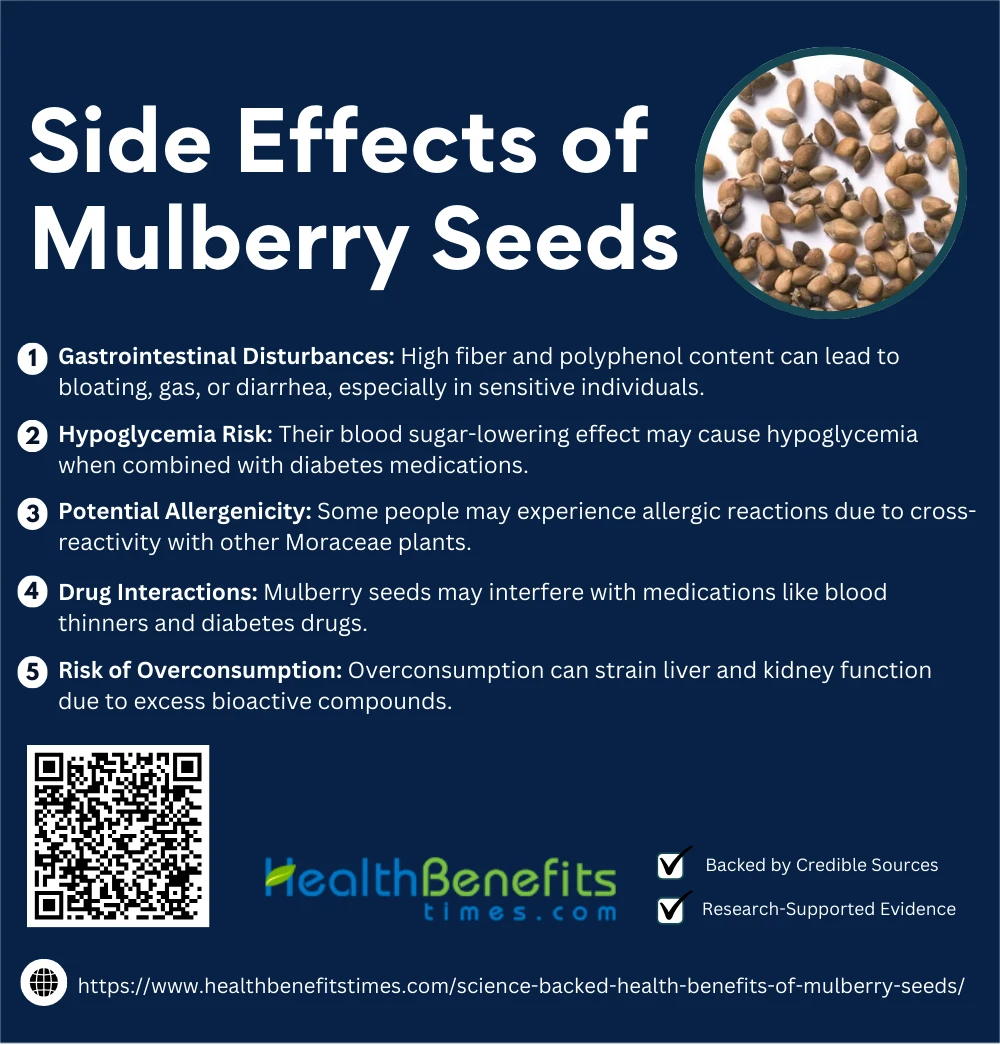 1. Gastrointestinal Disturbances
1. Gastrointestinal Disturbances
Mulberry seeds are high in insoluble fiber and polyphenols, which may lead to bloating, gas, or diarrhea when overconsumed. Their fermentable fiber content can aggravate symptoms in IBS sufferers. A clinical analysis, prebiotic review, and phytochemical study support the link between fiber-rich foods and gastrointestinal discomfort. (31) (39) (32)
2. Hypoglycemia Risk
Mulberry seeds contain 1-deoxynojirimycin, which inhibits alpha-glucosidase, potentially causing dangerously low blood sugar when combined with antidiabetic drugs. This hypoglycemic effect is beneficial for diabetics but risky without medical supervision. Evidence from a clinical trial, metabolic review, and glucose regulation study confirm this interaction. (35) (34) (33)
3. Potential Allergenicity
Mulberry seeds may trigger allergic reactions in individuals sensitive to the Moraceae plant family, leading to symptoms like rashes, itching, or anaphylaxis. Cross-reactivity has been observed in those allergic to figs and jackfruit. Documented case studies, pollen-allergen research, and botanical allergy reviews confirm allergenic risks.
4. Drug Interactions
Bioactive compounds in mulberry seeds can interfere with medications, especially antidiabetic and anticoagulant drugs. Their ability to modulate enzyme activity may amplify or inhibit drug effects. Pharmacokinetic evidence, enzyme interaction studies, and nutraceutical reviews warn of possible adverse drug interactions. (33) (34) (32)
5. Risk of Overconsumption
Excessive intake of mulberry seeds can overload the body with bioactive compounds like oxalates and polyphenols, potentially straining liver and kidney function. Studies warn against high-dose consumption due to potential hepatotoxicity, mineral accumulation, and nutrient interference, especially in those with pre-existing conditions. (40) (32)
Conclusion
Mulberry seeds are a powerful yet underappreciated source of nutrition, offering a wide range of science-backed health benefits. From their antioxidant and anti-inflammatory properties to their potential in supporting heart health, blood sugar regulation, and brain function, these seeds stand out as a valuable addition to a balanced diet. Their rich phytochemical profile and essential nutrients make them beneficial for skin, immunity, and overall wellness. However, like any natural remedy, they should be consumed mindfully, especially by individuals with specific health concerns. As research continues, mulberry seeds may gain wider recognition as a functional food with therapeutic potential.


